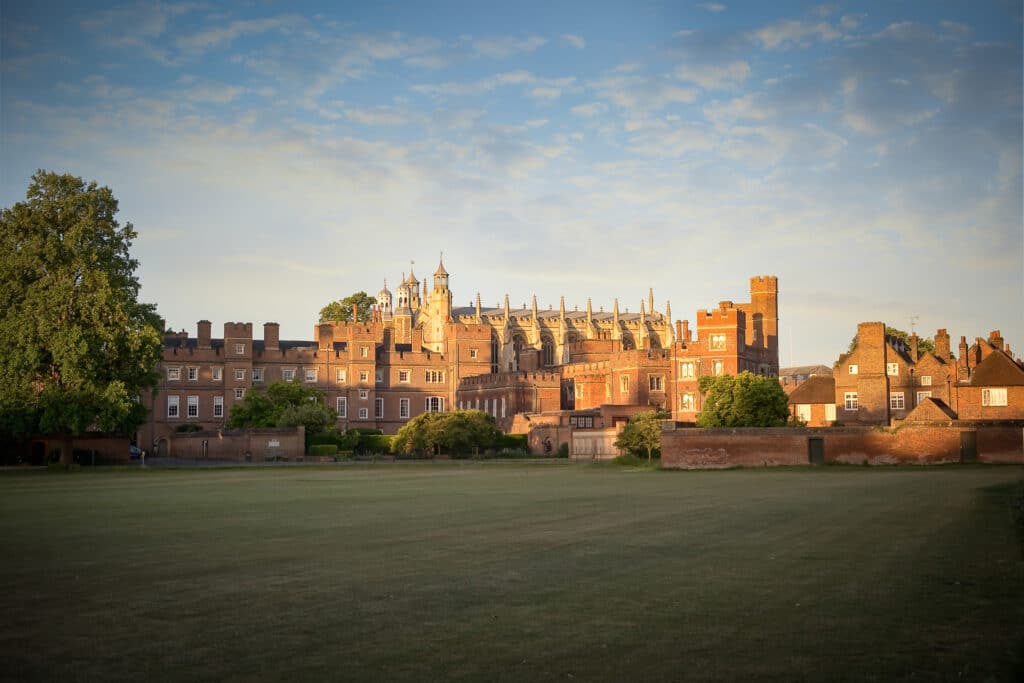Where can we find you at Eton?
You’ll find me in my office, or if I’m not there you might spot me running by the river. I listen to philosophy podcasts or Radio 4’s In Our Time while I’m jogging. I really enjoy Melvyn Bragg’s abrupt and abrasive style of questioning. Sometimes he really cuts to the point and at other times he completely misses it, which makes me smile. I’ve got no interest in increasing my pace or my health, I just love the sense of motion and the release.
Where are you from?
I grew up in a small town between Wigan and Manchester called Leigh. Well, I tell people I’m from Manchester. My mum prefers to say we’re from Lancashire.
Your parents met at the dentists?
Yes! My mum was a dental nurse. My dad — a chartered surveyor and estate agent — kept coming back for more appointments until the dentist suggested he probably didn’t need any more examinations and he should probably just ask her out.
How religious was your own upbringing?
My mum is a Roman Catholic and my dad’s a tolerant atheist who will happily attend church on Christmas Day. I was christened in the Church of England. I went to church along with my younger brother but there was lots of lively debate around the dinner table on Friday nights. Everything was discussed very openly: from morbid conversations about funerals to whether the wedding service was too patriarchal. We also talked a lot about morality, about whether or not we needed God to be good. I was raised with a profound respect for religion and a real curiosity about the philosophy that can make it impossible to fully align with a life based on faith.
How did you make your mark on those Friday night dinners?
The family tradition was based around steaks at the end of the week. But as a teenager I became vegetarian and was committed to energising the family in the debate over animal rights. I was a troublesome teenager in all sorts of ways.
How would you describe your own position on faith?
I prefer not to say; the boys at Eton try very hard to try and work out what I really believe. I can get quite passionate about a good debate and the boys do try to trigger me. But I like to keep them guessing. In the classroom I enjoy standing back and watching them work through the ideas and emotions. It’s their journey of discovery, not mine. It’s such a privilege to share it with them.
Were you an academic child?
Absolutely, at least I loved school. I think my brother is more intelligent than me but he wasn’t academic. I went to a lovely state primary school and had a brilliant time before heading to a girls school in Bolton – which is where I met many of my closest friends. The only thing I didn’t enjoy was French – oh, and music! I tried so many instruments: the recorder, the piano, the cornet, the flute… It was never going to be my talent. I have accepted that I have to enjoy other people’s achievements on that score and despite the many intersections between music and divinity at Eton I’m relieved to say nobody has ever attempted to coax me into any singing.
As a child I attended weekend drama and dance classes until I was fifteen. The freedom of expression gave me a huge release. I’ve loved being involved with the drama at Eton. I’ve done some choreography and directing.
Childhood ambition?
Oh, I really wanted to be a police officer and I did apply to join the police force.
Would your childhood friends be surprised to hear what you do now?
Teaching wouldn’t surprise them, but Eton might. It’s a strange, impressive place. It has taken me a while to adjust to the quirks, the culture and the universal politeness of all the boys. I remember being fascinated by traditions like “the Leg-It”. That’s when boys wishing to protest write a letter to the Head Master and then they all run — or leg it — with that letter. Afterwards the boys are all quite exhilarated and proud to show staff their ‘war wounds’.
What makes you happy?
My adoring labradoodle, Freddie. He’s happy meeting the boys in my office but I don’t think he’ll be coming into the classroom as he’s a bit of a distraction.
Freddie is named after..?
A fascinating Old Etonian philosopher called Alfred Ayer (1910-1989). A loveable rogue! A militant atheist who studied under Wittgenstein and went on to have a religious experience.
And you got married recently?
In Devon, in December 2019. We were married by Eton’s Conduct (senior chaplain). The best part of our wedding was watching the Eton staff getting down on the dance floor. They all really moved to a heavy club track and that fascinated the other guests!
What do you feel you’ve achieved in your time as the first female Head of Divinity at Eton?
Just being in this post — and having the boys see a woman do the job — feels like an important achievement. I’m glad they see that my husband — a solicitor working for an investment bank — is always happy to bring out the tea and cake. He busts gender stereotypes and that is important to me.



